April 7, 2019, 8:58 am | by Ray Nardo
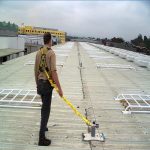 In this blog we will continue to discuss the hierarchy of fall protection and another way for employers to protect their workers. As previously noted, each fall risk situation should be analyzed on a case by case basis so it is important to understand the work being performed, access to the work area, and the frequency of the work. Here, we will discuss the 3rd solution on the hierarchy of fall protection pyramid- Fall Restraint Systems also known as Travel Restraint Systems. Sometimes, Passive Fall Protection Systems- like guardrail- which was discussed in last month’s blog- is not an option and is why an employer moves to the next option on the hierarchy- a Fall Restraint System. Read more.
In this blog we will continue to discuss the hierarchy of fall protection and another way for employers to protect their workers. As previously noted, each fall risk situation should be analyzed on a case by case basis so it is important to understand the work being performed, access to the work area, and the frequency of the work. Here, we will discuss the 3rd solution on the hierarchy of fall protection pyramid- Fall Restraint Systems also known as Travel Restraint Systems. Sometimes, Passive Fall Protection Systems- like guardrail- which was discussed in last month’s blog- is not an option and is why an employer moves to the next option on the hierarchy- a Fall Restraint System. Read more.
February 28, 2019, 10:02 pm | by Ray Nardo
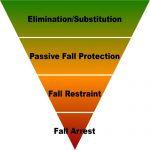 As discussed in last month’s blog understanding the hierarchy of fall protection will help an employer and employees who are working at heights make their work environment as safe as possible. In this blog we will talk a little more about Fall Prevention Systems which is second on the hierarchy of fall protection. Fall Prevention Systems are second on the hierarchy because the first solution– Elimination- preventing access or removing the hazards is always the safest and best first solution. For instance, removing an air handler from the roof to the ground or replacing a ladder with a stairway are ways to eliminate the fall hazard. Ideally, the safest option to ensure worker safety is to completely eliminate the fall hazard. However, if this not possible a Fall Prevention System can be installed to create a barrier which is another way of eliminating the hazard. Read more.
As discussed in last month’s blog understanding the hierarchy of fall protection will help an employer and employees who are working at heights make their work environment as safe as possible. In this blog we will talk a little more about Fall Prevention Systems which is second on the hierarchy of fall protection. Fall Prevention Systems are second on the hierarchy because the first solution– Elimination- preventing access or removing the hazards is always the safest and best first solution. For instance, removing an air handler from the roof to the ground or replacing a ladder with a stairway are ways to eliminate the fall hazard. Ideally, the safest option to ensure worker safety is to completely eliminate the fall hazard. However, if this not possible a Fall Prevention System can be installed to create a barrier which is another way of eliminating the hazard. Read more.
February 4, 2019, 9:19 pm | by Ray Nardo
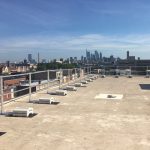 Understanding the hierarchy of fall protection is important because it allows companies to make the best possible choice in protecting their workers who are working at heights. FallProof Systems can help your company in understating this hierarchy; identify fall risks and hazards and then offer solutions. Read more.
Understanding the hierarchy of fall protection is important because it allows companies to make the best possible choice in protecting their workers who are working at heights. FallProof Systems can help your company in understating this hierarchy; identify fall risks and hazards and then offer solutions. Read more.
January 4, 2019, 1:49 pm | by Ray Nardo
Netting Systems Save Lives
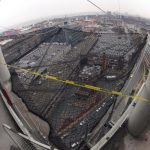 Horizontal Perimeter Netting (HPN) Systems save lives by catching a falling worker before they hit the ground. With its concentration of skyscrapers and crowded streets, it is no surprise that New York City has led the nation in requiring HPN systems on high-rise construction projects. Due to its close proximity to NYC, Fallproof has been a leader in the design, testing and supply of HPN systems and components for over 20 years. Read more.
Horizontal Perimeter Netting (HPN) Systems save lives by catching a falling worker before they hit the ground. With its concentration of skyscrapers and crowded streets, it is no surprise that New York City has led the nation in requiring HPN systems on high-rise construction projects. Due to its close proximity to NYC, Fallproof has been a leader in the design, testing and supply of HPN systems and components for over 20 years. Read more.
July 25, 2018, 2:47 pm | by Ray Nardo
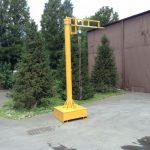 Annual Inspections are a vital part of a fall protection plan for the work place. The fall protection plan is designed to protect both the worker and the employer. Without proper maintenance, any piece of equipment can become unreliable over time. Workers who use systems on a daily basis may not notice gradual deterioration, as there can be virtually no change from one day to the next. Read more.
Annual Inspections are a vital part of a fall protection plan for the work place. The fall protection plan is designed to protect both the worker and the employer. Without proper maintenance, any piece of equipment can become unreliable over time. Workers who use systems on a daily basis may not notice gradual deterioration, as there can be virtually no change from one day to the next. Read more.
June 12, 2018, 9:18 pm | by Ray Nardo
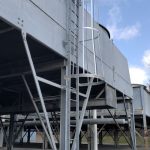 A common item found throughout many workplaces is the fixed ladder and it can be easily overlooked until the time comes when it is needed. We may pass by them each day without much thought, but when the time comes and the ladder is needed, we want to be sure we are protected. OSHA put out new safety guidelines in January of 2017 for all fixed ladder systems in the new Walking -Working Surfaces Standard to help provide more protection for you, the workers of America. All general industries are affected by the changes and revisions to the guidelines for fall protection systems and other safety features. Read more.
A common item found throughout many workplaces is the fixed ladder and it can be easily overlooked until the time comes when it is needed. We may pass by them each day without much thought, but when the time comes and the ladder is needed, we want to be sure we are protected. OSHA put out new safety guidelines in January of 2017 for all fixed ladder systems in the new Walking -Working Surfaces Standard to help provide more protection for you, the workers of America. All general industries are affected by the changes and revisions to the guidelines for fall protection systems and other safety features. Read more.
April 11, 2018, 2:32 pm | by Scott Daly
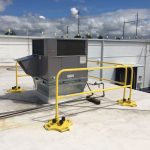 FallProof Systems LLC has designed, provided, and installed non-penetrating guardrail on rooftops and elevated surfaces throughout construction sites and general industry locations. Guardrails are becoming a leading choice for building owners to protect workers and personnel from fall hazards.
FallProof Systems LLC has designed, provided, and installed non-penetrating guardrail on rooftops and elevated surfaces throughout construction sites and general industry locations. Guardrails are becoming a leading choice for building owners to protect workers and personnel from fall hazards.
No matter your industry, guardrails are a vital part of your workplace protection strategy. Though guardrails often go unnoticed or ignored, they are an important fixture in every OSHA-compliant facility. Read more.
January 24, 2018, 3:39 pm | by Scott Daly
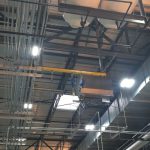 FallProof single point anchors provide a cost effective fall protection in manufacturing plants, distribution centers, steel mills, and other industrial facilities. Typical applications for single point anchors include manufacturing equipment maintenance, routine maintenance on elevated equipment, heavy equipment manufacturing, and processing equipment in food manufacturing. Other applications include access to tops of storage tanks, safe access to security cameras and other equipment mounted near a roof edge. Single point anchors also provided fall protection for workers where ceiling features such as pipes or air ducts prevent the installation of long run horizontal lifelines and rigid track systems. An often overlooked use of SPAs is to provide an anchor for a rescue and retrieval system which is required by OSHA as part of a complete fall protection plan. The single point anchor is a versatile fall protection application that offers a variety of solutions for different industries.
FallProof single point anchors provide a cost effective fall protection in manufacturing plants, distribution centers, steel mills, and other industrial facilities. Typical applications for single point anchors include manufacturing equipment maintenance, routine maintenance on elevated equipment, heavy equipment manufacturing, and processing equipment in food manufacturing. Other applications include access to tops of storage tanks, safe access to security cameras and other equipment mounted near a roof edge. Single point anchors also provided fall protection for workers where ceiling features such as pipes or air ducts prevent the installation of long run horizontal lifelines and rigid track systems. An often overlooked use of SPAs is to provide an anchor for a rescue and retrieval system which is required by OSHA as part of a complete fall protection plan. The single point anchor is a versatile fall protection application that offers a variety of solutions for different industries.
Read more.
March 20, 2017, 4:41 pm | by Ray Nardo
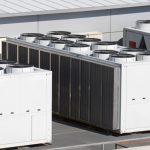 Industrial size HVAC chillers present multiple fall protection hazards. When located on a rooftop near an unprotected edge, simply approaching the chiller may expose your worker to the risk of falling. Roof edge guardrail, horizontal lifelines, and fixed anchor points can all be designed to protect your workers as they approach and service the lower areas of the equipment. However, from a hazard analysis standpoint, access to the fans from the top of the housing is probably the area with the greatest risk of falling. Read more.
Industrial size HVAC chillers present multiple fall protection hazards. When located on a rooftop near an unprotected edge, simply approaching the chiller may expose your worker to the risk of falling. Roof edge guardrail, horizontal lifelines, and fixed anchor points can all be designed to protect your workers as they approach and service the lower areas of the equipment. However, from a hazard analysis standpoint, access to the fans from the top of the housing is probably the area with the greatest risk of falling. Read more.
August 24, 2016, 11:59 am | by Ray Nardo
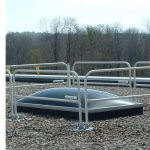 Skylight railings and screens save lives. If your workers are required to work on a roof and are exposed to an unprotected skylight without a guardrail around it or a screen over it, it is, according to OSHA, the equivalent of exposing them to a hole in the roof. OSHA has recorded 47 fatalities from skylight fall-throughs since 2010, with the most recent occurring last month in California. OSHA noted that over the past six years, the fall-throughs arose from a variety of worker behaviors while on, over and around skylights, such as: Read more.
Skylight railings and screens save lives. If your workers are required to work on a roof and are exposed to an unprotected skylight without a guardrail around it or a screen over it, it is, according to OSHA, the equivalent of exposing them to a hole in the roof. OSHA has recorded 47 fatalities from skylight fall-throughs since 2010, with the most recent occurring last month in California. OSHA noted that over the past six years, the fall-throughs arose from a variety of worker behaviors while on, over and around skylights, such as: Read more.
 In this blog we will continue to discuss the hierarchy of fall protection and another way for employers to protect their workers. As previously noted, each fall risk situation should be analyzed on a case by case basis so it is important to understand the work being performed, access to the work area, and the frequency of the work. Here, we will discuss the 3rd solution on the hierarchy of fall protection pyramid- Fall Restraint Systems also known as Travel Restraint Systems. Sometimes, Passive Fall Protection Systems- like guardrail- which was discussed in last month’s blog- is not an option and is why an employer moves to the next option on the hierarchy- a Fall Restraint System. Read more.
In this blog we will continue to discuss the hierarchy of fall protection and another way for employers to protect their workers. As previously noted, each fall risk situation should be analyzed on a case by case basis so it is important to understand the work being performed, access to the work area, and the frequency of the work. Here, we will discuss the 3rd solution on the hierarchy of fall protection pyramid- Fall Restraint Systems also known as Travel Restraint Systems. Sometimes, Passive Fall Protection Systems- like guardrail- which was discussed in last month’s blog- is not an option and is why an employer moves to the next option on the hierarchy- a Fall Restraint System. Read more.









